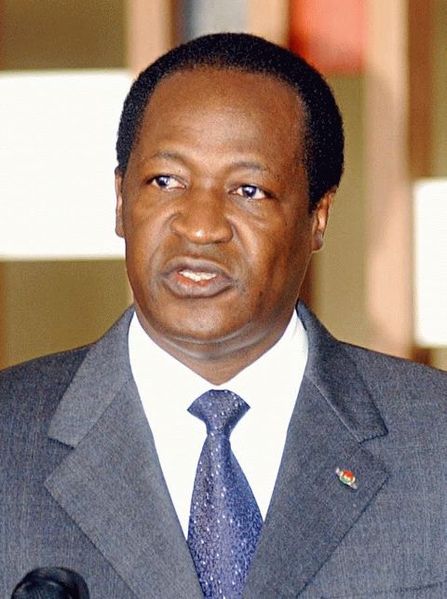Widespread protests erupted in Burkina Faso on January 18 against constitutional reforms proposed by President Blaise Campaoré. But what do the protests mean, and why have the reforms inspired such a passionate reaction from the people of Burkina Faso? What would the implications of a prolonged crisis be for the region?
What sparked the protests?
The demonstrations were organised by the opposition to protest a change to the constitution that would allow Campaoré, who has been in power since 1987, to run for a third five-year term come the 2015 elections. This revision to article 37 of the constitution, which currently stipulates that presidential mandates must be limited to two five-year terms, is strongly opposed within some political circles as well as by voters.
Jan18th, 2014. #Burkina. Another mvt like this and Blaise #Campaoré (27 years in power) will step down. Big Up! pic.twitter.com/l1aghkxYGw
— Alain Doh Bi (@AlainDohBi) January 19, 2014
The two-term limit was approved in 2005 and cannot be applied retroactively, so Compaoré was allowed to run for office despite his nearly two decades of rule at the time.
The beginnings of opposition to the proposed change began to emerge the week before the changes when 75 members of the ruling party quit in protest of the absence of consensus within the party.
An already controversial government
This isn't the first time President Compaoré's authority has been called into question during his current term of office. In February 2011, protests flared up in the capital Ouagadougou and across the rest of the region, following deadly beating of a student by police in Kougougou.
To quell the dissent, Compaoré brought together the governors of all 13 regions and proposed measures to increase the purchasing power of students via increases in scholarships and stipends. Police violence and the murder of the president's opponents seemed to increase between 1990 and 2000. The common thread linking the riots was objection to rampant corruption and the presidential family's ever increasing wealth.
What the crisis means for the region
The effects of these demonstrations will be felt beyond the borders of Burkina Faso. Compaoré invited Guillaume Soro, president of the neighboring Côte d'Ivoire's Senate, to mediate the crisis. Following the November 2010 presidential election, that country experienced a drawn-out governance crisis after the two opposing leaders, Laurent Gbagbo and Alassane Ouattara, both claimed victory. Protests and all-out violence marked the period from the initial standoff, as neither Gbagbo nor Ouattara showed signs of backing down. After months of conflict, Ouattara's troops eventually overran the country and stormed the presidential palace and captured Gbagbo with the help of French troops in April 2011.
Ivorian blogger Théophile Kouamouo drew the following conclusions from the meeting between Burkina Faso's president and the president of the Ivory Coast's Senate:
Depuis l’annonce, il y a une dizaine de jours, de la démission collective de plusieurs membres éminents du Congrès pour la démocratie et le progrès (CDP), parti du numéro un burkinabé Blaise Compaoré, les principales figures du régime Ouattara donnent l’impression que la seule idée de voir celui qui règne sur Ouagadougou depuis bientôt 27 ans à la retraite leur fait perdre tout sang-froid et les pousse à douter de leur propre avenir politique [..] Et si c’était finalement Guillaume Soro qui avait le plus à gagner dans le maintien au pouvoir de Blaise Compaoré, qu’il présente volontiers comme son « mentor » ? Il est probable que l’équilibre des relations pas toujours très claires entre Ouattara et son « dauphin constitutionnel » ait besoin de l’entregent du maître de Ouaga pour ne pas sombré dans la franche adversité.
Since the announcement ten days ago of the collective resignation of several senior members of the Congress for Democracy and Progress (CDP), Blaise Compaoré's party, key politicians from the Ouattara regime in Cote d'Ivoire seem panicked at the very idea of seeing Compaoré, the one who has ruled over Ouagadougou [capital city of Burkina Faso] for nearly 27 years leave power for good. This possibility seem to have made them realize the fragile nature of their own political futures. […] And so what if it was ultimately Guillaume Soro who had the most to gain by keeping Blaise Compaoré in power, who he freely hails as his “mentor”? It is likely that the not always manifest balance of relations between Ouattara and his “constitutional successor” will require the interpersonal skills of the master of Ouagadougou so as not to slip into open adversity.
Laye Doulougou, a Burkinabe living in Ivory Coast, had a different view on the mediation:
Gardez vous de vous ” immiscer” dans les affaires du Faso lorsque que de bonnes âmes, dans un élan de solidarité sous régionale, l’aident à préserver sa stabilité et sa cohésion.
Nous autres burkinabé avons encore des souvenirs pas si lointains de la longue crise qu’a connue la Côte d’Ivoire et ne voulons pas voir notre pays vivre des moments pareils. Nous croyons en une Afrique stable, une Afrique panafricaine en paix et qui se développe grâce à des médiations de ce genre
Beware of “meddling” in the affaires of Faso while good souls, on the impetus of sub-regional solidarity, try tp help preserve its stability and its cohesion.
For the rest of us Burkinabes, the long crisis suffered by Ivory Coast is a not too distant memory, and we do not want to see our country go through the same thing. We believe in a stable Africa, a peaceful, pan-African Africa developed as a result of this type of mediation








4 comments